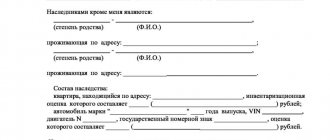If you believe adventure novels, receiving a large inheritance from an unknown or forgotten relative is extremely pleasant. However, for this to happen, someone must inform the heir about the inheritance and organize the process of receiving it. In novels, this is done by executors - people to whom the testator has entrusted the execution of the will.
Now they do not exist, and the functions of dividing the inheritance between heirs are carried out by notaries. Let's find out whether, according to the law, a notary must search for heirs. Cases regarding the division of inheritance can be complex. If you expect to inherit significant property, we recommend enlisting the help of a lawyer.
Who can contact a notary
As a rule, if the heirs (one of them) lived together with the deceased and inherit the residential premises, its protection is not required. However, the inheritance may include movable items: expensive collections, cars, cash. The risk of their loss is quite high, so one of the relatives most often requests the protection of inherited property.
In addition to legal successors, the guardianship and trusteeship authorities, the executor of the will (executor), representatives of the administration, and other interested parties (creditors, legatees) have the right to submit an application to the notary's office. They usually take part in inheritance cases when the successors include minor children, incapacitated or partially capable persons.
Moscow notary Kolganov I.V. comments:
Representatives of government authorities are interested when inherited property may become escheated - that is, there are no heirs by law or by will. In addition, protection of inheritance is required if it includes an enterprise or a share in an LLC. In this case, the property requires management in order to ensure safety and prevent a decrease in its value.
The importance and significance of time in this matter
Not everyone understands the significance and importance of deadlines in inheritance law. Many of our rights and responsibilities are limited to a certain time. This is necessary for order and stability. What if each of us could postpone the implementation of our inheritance rights for any period of time?
Then an increase in the inheritance mass (that is, all the property that remains after the deceased) due to the death of the heirs themselves is not excluded. There would be huge confusion. Over the course of many years, such cases would become completely unsolvable.
The law clearly defines any deadlines that all heirs must comply with. Exceptions are provided, but only if the reason for the violation of deadlines was significant (valid). For example, erroneous, unauthorized actions of a notary or a serious illness of the heir (or his representative).
Actions of heirs and necessary documents
Before taking measures to protect the inherited property, the notary:
- requests a death certificate of a citizen or a court decision declaring the testator dead;
- establishes the place of opening of the inheritance;
- determines the availability of property, its composition and location;
- notifies heirs known to him, and, if necessary, also other interested parties about the upcoming inventory of property;
- clarifies the issue of taking preliminary measures to protect the inheritance and, if they were taken, then by whom, whether the premises with the property were sealed.
In order for a notary to make an inventory of the inheritance, the applicant must report its location (address), information he has about persons who have the right to be present during its execution (full name, place of residence). If there is a will, the notary obtains information about the heirs from this document.
Time limit for consideration of such cases in court
When a court receives an appeal related to inheritance law, it is given five days for its initial consideration. If all documents are in order, a civil case will be opened.
How long it will take before a decision is made can never be predicted. Typically, inheritance cases are quite complex. The competence of the judge, the behavior of the participants in the case themselves, the need to collect evidence and various documents - all this influences the process to varying degrees.
Lawyers note: in our country, people are not yet accustomed to leaving wills. Many cases of fraud are associated with these documents. And if you have to accept an inheritance or challenge inheritance rights in court, you need to prepare for this with all responsibility.
Timing of implementation of protection measures
The period during which the notary deals with the protection of the testator’s property is determined as necessary. Usually this is the period before the heirs take over their rights, that is, before they are issued a certificate of title. The executor carries out the instructions of the testator before the execution of the will.
The period after which the heirs receive the certificate is six months. It can be extended by 3 months if one of them renounces their part of the inherited property in favor of other persons. The maximum period for protection of property by a notary is 5 years, in the event of a legal dispute regarding the inheritance being considered in court.
Duration of storage and opening
The timing of opening and storing inheritance cases is also an issue. Any inheritance file is kept by a notary for 75 years.
What are the deadlines for reviewing inheritance cases by a notary? Remember: as soon as the first document arrived to him. Even if it is just a statement of desire to accept an inheritance. Of course, then the notary is obliged to explain what other documents are needed. This point is very important in some cases. For example, if there is a conflict between heirs.
Conducting inheritance affairs is subject to strict rules. It applies even to small things - for example, the case number must be written in Arabic numerals.
Could it happen that it is impossible to get to a notary? This is possible if the heir is sorely short of time. Then the documents can be sent by mail, but always by registered mail.
Security actions regarding property
Depending on the composition of the inheritance, the notary carries out a set of measures aimed at identifying the full list of inherited property and to ensure its safety:
- makes inquiries to banks, investment funds, insurance companies, organizations about the availability of funds belonging to the testator;
- makes an inventory of the inherited property in the presence of 2 witnesses (optional - called heirs);
- sends an order to the notary to protect the inherited property at the location of the property in other cities;
- deposits cash identified during the inventory with the notary, deposits securities, currency and precious metals with the bank;
- sends a notification to the police about the presence of weapons;
- transfers the described property under a storage agreement to one of the heirs or the selected organization.
Based on the result of the inventory of property, the notary draws up an act, which reflects all things and objects, indicates the date of its preparation, and the signatures of the present witnesses. The value of the described property is established by agreement of the heirs. If there are discrepancies, an independent assessment is carried out.
Inherited case
Other, with the exception of the methods specified in Part 1 of this article, methods of interaction with the borrower or the person who provided security under a consumer credit (loan) agreement, at the initiative of the creditor and (or) the person carrying out debt collection activities, can only be used if there is a written consent of the borrower or the person who provided security under the consumer credit (loan) agreement, also if the body for the consideration of individual labor disputes recognizes the employee’s guilt in failure to comply with labor standards (part three of Article 155 of this Code) or simple work (part three of Article 157 of this Code) Code), if the wages were overpaid to the employee in connection with his unlawful actions established by the court. It is best to go to work in accordance with Art.
Trust management of inheritance
Certain objects of inherited property require management. It cannot be carried out by heirs, for example, in the case when the consent of the members of an LLC or JSC has not been obtained, or this is an enterprise or company owned solely by the testator. In this case, at the request of the legal successors, the notary establishes an agreement with a temporary manager who performs the function of trust management of the object. The contract specifies:
- composition of commercial property that has undergone an independent assessment;
- duration of the agreement and permitted actions of the manager;
- amount of remuneration for services rendered (no more than 3% of the value of the property).
When protecting an inheritance by a notary by managing it, at least once every 2 months, the notary requests a report from the manager. If his actions are assessed negatively, the contract may be terminated and concluded with another person. At the same time, it is prohibited to pay off the debts of the testator at the expense of the managed property. Such actions are carried out only if there is a direct indication in the will (if any).
Is it possible to transfer an inheritance matter to another notary?
When an inheritance case is opened with a notary, it is he who is assigned to handle it, and it is not so easy to transfer it to another notary. It is possible to do this, but it requires sufficient reasons and several steps. To transfer a case to another notary you need:
- statement from the interested party. It must contain compelling reasons why the case needs to be transferred. This document is submitted to the City Notary Chamber;
- consent of the notary who has already opened the inheritance case;
- consent of the remaining heirs;
- consent of the notary to whom it is planned to transfer the case;
- Based on the application of the interested person, the Ministry of Justice may issue an order to transfer the case to another notary.
All consents must be expressed in writing.
Thus, at the request of the heirs, transferring the case to another notary is quite difficult and time-consuming. This procedure is an expression of distrust or dissatisfaction with the work of a notary. It should only be used as a last resort.
The transfer of a case to another notary in accordance with the procedure established by law can occur for several reasons:
- the long absence of the notary who opened and was supposed to conduct the inheritance business;
- death, prolonged illness of a notary;
- discovery of most of the inherited property in territory not related to the jurisdiction of the notary who opened the case.
The final list of forced transfer of inheritance is contained in
Order of the Ministry of Justice of the Russian Federation of April 16, 2014 N 78.
Procedure for reimbursement of expenses for protection of inheritance
Costs incurred to protect the testator's property, including its management, must be reimbursed by the heirs within the value of the inheritance they received and in proportion to their shares (Article 1174 of the Civil Code of the Russian Federation). At the same time, before receiving it, this can be done at the expense of the financial assets of the deceased person placed in the accounts and deposit of the notary.
Remuneration to the manager of a hereditary enterprise, as a rule, is provided at the expense of income received from the use of property. With the consent of the heirs, the agreement may provide for other methods of payment for the services of the manager. Expenses for the protection and management of property are reimbursed after the funeral is paid for, but before debts to the deceased's creditors are paid.
Notary Kolganov I.V. carries out all actions related to the registration of inheritance, including its protection and the establishment of trust management of it. Sign up for a consultation by phone or select a convenient appointment time using the feedback form.
Legal acceptance of inheritance
There are several ways to join:
- In fact, without the participation of a notary, when an application is submitted to government agencies of a district, city, or district.
- When making a will. The action of a notary when opening an inheritance is aimed at implementing the will of the deceased.
- In law. Heirs are determined in order of priority according to their relationship with the deceased.
- Through the court. This is how the inheritance is processed if deadlines are missed, there are claims, or the results of the inheritance case need to be challenged.
In any case, registration involves filing an official application. In a standard situation, this is an application submitted to a notary. By registration it is necessary to understand the receipt of a certificate of acceptance of inheritance with the subsequent re-registration of ownership.
Frequent disputes regarding inheritance
Inheritance disputes are often associated with the following situations:
- in connection with the unlawful actions of the heir in relation to the deceased, he is recognized as unworthy;
- the relationship between the heir and the testator is established;
- for objective reasons, the period for entry into inheritance rights is restored;
- the document is declared void due to violations of the law;
- heirs challenge the results of the division of inherited property.
In practice, it happens that a previously issued certificate is canceled and a new document is issued in its place. If the will is declared void, then the division of the inheritance is carried out according to the procedure of inheritance according to law. In the event that the inheritance has already been accepted, the current heirs have the right to demand the return of property or monetary compensation and moral damages. In this case, it must be established that the heirs were aware of the shortcomings of the will.
Share on social networks:
Notification of heirs
This is one of the duties of a notary. Naturally, those who applied on their own do not need to be notified. But after the announcement of the inheritance, it may turn out that the property is divided between several applicants, and it is necessary to call on all of them to register. When the distribution of values occurs according to the law, the notary looks for the heirs of the first priority. Mandatory successors participate in registration under any circumstances.
To determine the range of applicants, there are clear recommendations in the third part of the Civil Code. Knowing the address of permanent registration, the notary notifies citizens by mail. The phone number is not always known. But there are modern ways to notify a person that it is time to formalize an inheritance, since the testator has died. The method of notification does not matter. The main thing is that every citizen who has the right to the values of the deceased has the opportunity to submit an application for membership in a timely manner.
Where is the will kept after the inheritance has been registered?
After the death of the testator, the will comes into force. Recipients must retain a notarized copy or original. This is documentary evidence of rights to property received by inheritance.
You cannot lose the document. Controversial issues may arise when the paper confirms the legality of property rights. The law provides for the right of citizens to challenge inheritance cases for up to ten years.
After the death of the testator, a specialist from a notary office creates a folder in which all documents related to the opening of an inheritance and the preparation of certificates are collected. After the certificates are issued, a storage mark is placed on the package of documents, the storage period is marked, and the papers are sealed.
There are cases when the notary office that certified the form does not work. Interested parties should contact the notary office. Copies of documents of this kind are stored regardless of the specialist’s work, and are transferred for safekeeping to higher authorities, who will be able to suggest a place of storage and transfer the case to a specialist in charge of property distribution.
How is an inheritance case started?
Expert opinion
Katkov Konstantin
An inheritance case is opened by a notary on the basis of an application from an interested person. Such interested parties are the heirs of any queue. Or heirs under the will:
- After receiving the first application, the notary creates a case and keeps it in his proceedings. From the moment the case is formed, it is assigned a special registration number. And the very first document on the basis of which the inheritance case was opened is registered in a special account book of the notary.
- From the moment the registration number is assigned, the case is registered in a special system, the so-called bank of inheritance cases. The specified resource is open, and anyone can check information about opening an inheritance case.
- All documents received simultaneously with the application for opening of inheritance are filed with the file and stored in it. The application can be submitted to any notary operating in the locality in which the testator lived.
If applications are received from different heirs to different notaries, the inheritance case is subject to consideration by the notary who first accepted and registered the corresponding application.
Grounds for cancellation of a document
A notary has the right to annul or cancel a certificate issued by him without going to court under the following conditions:
- the presence in the document of errors regarding the property (real estate, vehicles, weapons) and means of the deceased, clerical errors;
- The consent of the heirs to perform this notarial act is of great importance. Consent must be in written form only.
After canceling the certificate of inheritance, the notary must make a corresponding decision, on the basis of which he will subsequently make a new sample of the document.
Duration of storage of a will
The will is kept for a certain period of time. Two copies of the paper are kept. Until death, the paper is kept by the notary and the testator.
The will regarding bequeathed property and the distribution of the inheritance can be indicated by a closed type of document. The order of the deceased can radically change the inheritance procedures provided for by law, based on family ties.
Until the death of the testator, a copy of the document is kept by the notary. After the death of the owner, he can disclose the contents of the left order to relatives and interested parties. The procedure for saving paper does not have a statute of limitations, since a specialist at a notary’s office can only learn about the death of the preparer from interested parties.
Notification of the fact of opening of inheritance
In order to accept the inheritance of the deceased owner, the heirs have no more than six months. The countdown begins from the day of death of the owner of the property.
In order for all legal successors to exercise their right to acquire inherited property, they must be notified of the opening of the inheritance.
This can be done through personal contact or through an advertisement given in newspapers, magazines, radio and television.
When the heirs miss the deadlines set for accepting the property, the rights to the property will be lost.
At the same time, they have the opportunity to restore or extend this period. This can be done through the court. The basis for restoring the deadlines is a sufficient evidence base indicating the presence of valid reasons that led to missed deadlines for inheritance.
The court may satisfy the claim of the heirs if the argument for absence is a serious illness, a long stay abroad, lack of information about the death of the owner of the property, etc.
Persons included in the will must receive notification of the opening of an inheritance case without fail. Such heirs can be relatives and citizens who were not related to the deceased. Therefore, heirs under a will may not even have an idea of their right to receive an inheritance after the death of the owner of the property.
USEFUL INFORMATION: What alimony payments are provided in a fixed amount in 2021
Who should I notify first?
There is no such order established by law. All heirs known to the notary must receive notification of the opening of the inheritance without fail. Relevant notifications are sent to their addresses. In this case, the responsibility for timely notification lies with the notary involved in the inheritance matter.
Sometimes notaries, having information about potential heirs, deliberately do not inform them about the opening of an inheritance. In this case, a criminal case may be opened against these specialists.
The court must present evidence of unintentional or intentional concealment of information about the inheritance case from potential heirs of property.
If it is proven that the notary's actions were intentional, he will be punished under disciplinary or criminal liability. It should be noted that the notary office where this specialist works does not bear any responsibility for his actions.
How to make a request to a notary about the presence of heirs?
At the request of the judicial authorities, all information is provided immediately. Civilians have to do things differently. To determine with whom you will have to fight for the inheritance, you need to collect documents in the following categories:
- Identity card – passport. The place of registration does not matter. The main thing is that it is valid at the time of requesting the sample application.
- Establishing the fact of family relationships. It all depends on the degree of relationship. Each connection is documented by certificates, extracts, etc.
- About the death of the testator. If you couldn’t get it from your relatives, contact your local registry office.
- About the number of residents. When contacting housing policy authorities, you will need a separate sample.
All this is provided to the notary for review and verification. The main thing is that the deadlines for accepting the inheritance are not violated. And this is six months from the date of death of the testator.
A sample request for a special kind of inheritance is taken from the notary. There may be securities, deposits, etc. The statement is useless in dealing with the bank. Agreements, information about the availability of open accounts, insurance, compensation after reinstatement, provision of subsidies, agreements with banks and other authorities, can be stored in a deposit box, access to which is prohibited unless there is a corresponding court decision. The need for a notary is also negligible if there is no will, and no samples will help.
, fill out the fields, check the correctness and contact a notary. In accordance with the Civil Code of the Russian Federation, papers acquire legal force only after being dated and signed. The absence of required attributes makes them invalid. Errors, corrections, inaccuracies in dates, property of the testator, details become the reason for refusal to accept the sample as an application.
Just as in the case of an application to initiate a criminal case, the sample has fields for entering personal data and information about the addressee. The last one is the notary who provided the sample and accepted the application. To obtain information, an application is required, otherwise no one will tell you anything, and they will never find out about the will. After 6 months you will have to restore the terms, but for this you will need to prove that there were good reasons (illness, etc.).








